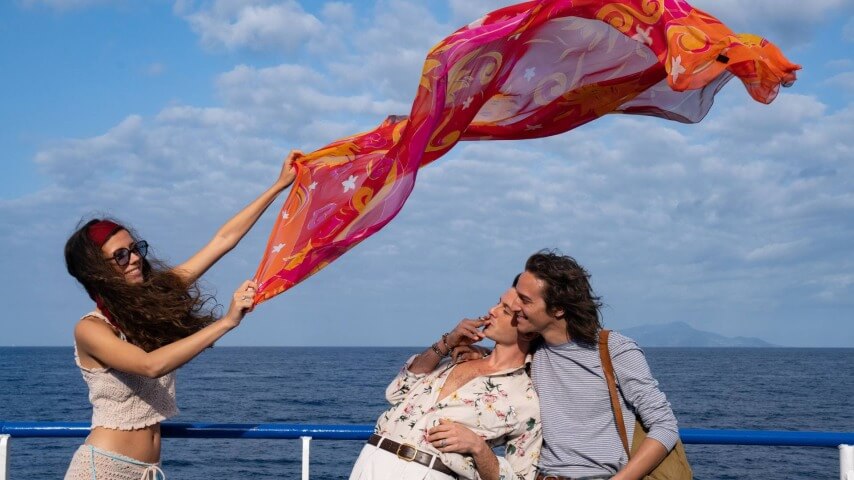The obvious point of comparison in Sorrentino’s filmography is the Oscar-winning The Great Beauty. Like the earlier film, Parthenope is episodic, unfolding through the 1960s, ‘70s, and ‘80s as an overlong series of parties, gatherings, dances, and rituals, with lengthy wordless passages of choreographed, gliding, gawking camerawork. (Not coincidentally, both films also open with quotations from Louis-Ferdinand Céline.) It’s overtly musical and mythic, with scenes and backdrops that seem designed to contrast one another: a cathedral and an urban underworld, a birth and a funeral, opulence and ruin.
After a prologue depicting her birth, we meet the adult Parthenope as she emerges from the sea into the late ‘60s, a slow-motion era of Vespas, miniskirts, and bikinis set to the steady rhythm of Wojciech Kilar’s “Exodus.” (Sorrentino re-uses the composition as a kind of seduction theme, perhaps because simply dropping in “Boléro” would be too middle-brow.) She sleeps in a fairy-tale gilded coach (a present from her godfather, a rotund man known only as “the Commander”), teasing her boyfriend while she avoids the incestuous advances of her sadsack older brother, Raimondo (Daniele Rienzo). She is an object of unconsummatable desire, with object being the operative word.
That is to say that, unlike Jep Gambardella, the intellectual protagonist of The Great Beauty, she lacks a believable interiority—which probably wouldn’t be as much of a problem if Sorrentino didn’t insist on structuring Parthenope as a kind of old-fashioned intellectual bildungsroman. Various oddball characters are encountered across the years and along the way: Greta Cool (Luisa Ranieri), bitter “diva of divas;” the reclusive acting coach Flora Malva (Isabella Ferrari), who always wears a black veil to conceal a face ruined by bad plastic surgery; Tesorone (Peppe Lanzetta), the vain cardinal who hangs around his cathedral wearing but a gold crucifix and a red speedo; and the real-life American writer John Cheever (Gary Oldman), portrayed as a tragicomic drunk.
The only one who seems resistant to Parthenope’s lithe looks (though not her intellect) is her academic mentor, Professor Marotta (Silvio Orlando), a sort of Droopy Dog in tweed. The rest make fools of themselves, or deliver monologues about love or God. Some do both. There are, in trademark Sorrentino style, moments of Catholic-Church-baiting blasphemy and playful surrealism (a gigantic bloated toddler makes an appearance), but for all of its eccentricities and ruminations, Parthenope can’t overcome the very prosaic problem of a main character who isn’t really much of a character at all. And given that most of the other characters are defined more or less exclusively by how they desire Parthenope, the result ends up feeling at once overstuffed and thin.
Director: Paolo Sorrentino
Writer: Paolo Sorrentino
Starring: Celeste Dalla Porta, Stefania Sandrelli, Gary Oldman, Silvio Orlando, Luisa Ranieri, Peppe Lanzetta, Isabella Ferrari
Release Date: February 7, 2025







![Rob Reiner's son booked for murder amid homicide investigation [Updated]](https://img.pastemagazine.com/wp-content/avuploads/2025/12/15131025/MixCollage-15-Dec-2025-01-10-PM-9121.jpg)

























![HBO teases new Euphoria, Larry David, and much more in 2026 sizzle reel [Updated]](https://img.pastemagazine.com/wp-content/avuploads/2025/12/12100344/MixCollage-12-Dec-2025-09-56-AM-9137.jpg)







